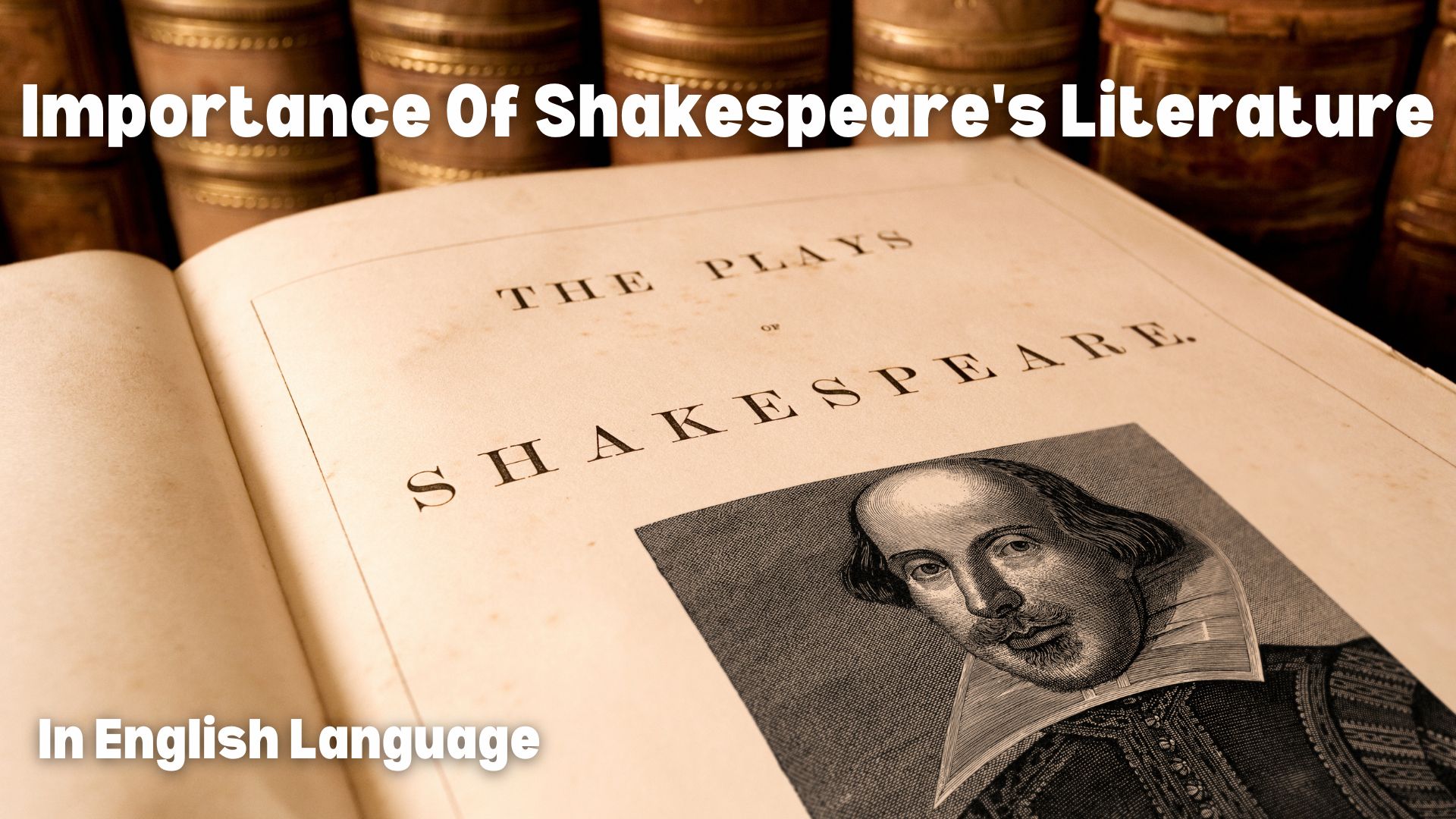Shakespeare literature in English language is more like a gift from the divine. There are so many things in Shakespeare’s literature that glorify the aspects of English literature and language. Shakespeare’s influence on English literature is immense.
His works are considered to be some of the most outstanding achievements in literature, and they continue to be studied and performed around the world. Shakespeare is renowned for his plays that feature intricate plots, beautiful language, and complex characters. Some of William Shakespeare’s most famous works include “Hamlet,”
“Romeo and Juliet,” “Macbeth,” and “Othello.” Shakespeare’s influence on the English language is also significant. He added numerous words and phrases to the English language that are still used today. Shakespeare’s works have inspired countless writers over the centuries, and his legacy continues to shape the world of literature today.
When Was William Shakespeare Born?
William Shakespeare was born in April of 1564 in Stratford-upon-Avon, located in England. The exact date of Shakespeare’s birth is not recorded, but it is most often celebrated worldwide on April 23rd. His baptism is recorded in the Parish Register at Holy Trinity Church, Stratford-upon-Avon, on Wednesday, April 26, 1564
William Shakespeare Family
William Shakespeare was the eldest son of John and Mary Shakespeare, who lived in Stratford-upon-Avon, Warwickshire. John was a glovemaker and a prominent citizen who served on the town council for many years. Mary was the daughter of a farmer from the nearby village of Wilmcote.
John and Mary lived in the house now known as Shakespeare’s Birthplace on Henley Street, Stratford-upon-Avon, when William was born. They had eight children in total. William married Anne Hathaway at age 18 and had three children. His younger siblings were Gilbert (1566-1612), Joan (1569-1646), Anne (1571-1579), Richard (1574-1613) and Edmund (1580-1607).
Gilbert likely lived in Stratford for the majority of his life. Joan was the only surviving daughter of John and Mary Shakespeare,and she was the only one of Shakespeare’s siblings to outlive him. In the late 1590s, she got married to William Hart, who was a hatter. Richard was named after his paternal grandfather. Unfortunately, Anne passed away at the age of eight.
Just like his brother William, Edmund pursued a career in acting in London. Southwark Cathedral in London is the final resting place of the person who passed away in the year 1607
William Shakespeare Education
William Shakespeare likely attended the King’s New School in Stratford, a free grammar school chartered in 1553, where he studied Latin grammar and classics. The reigning monarch’s religious beliefs influenced the school, and some headmasters resigned because of their Catholic faith. There is no record of him completing his studies or going to university.
William Shakespeare Works
William Shakespeare is widely known for his plays, but he was also a prolific poet. He wrote 154 sonnets, two long-form narrative poems, and several shorter poems. Here is a list of all the plays that are widely believed to have been written by William Shakespeare:
- All’s Well That Ends Well
- Antony and Cleopatra
- As You Like It
- The Comedy of Errors
- Coriolanus
- Cymbeline
- Hamlet
- Henry IV, Part I
- Henry IV, Part II
- Henry V
- Henry VI, Part I
- Henry VI, Part II
- Henry VI, Part III
- Henry VIII
- Julius Caesar
- King John
- King Lear
- Love’s Labour’s Lost
- Macbeth
- Measure for Measure
- The Merchant of Venice
- The Merry Wives of Windsor
- A Midsummer Night’s Dream
- Much Ado About Nothing
- Othello
- Pericles, Prince of Tyre
- Richard II
- Richard III
- Romeo and Juliet
- The Taming of the Shrew
- The Tempest
- Timon of Athens
- Titus Andronicus
- Troilus and Cressida
- Twelfth Night; or, What You Will.
- The Two Gentlemen of Verona.
- The Two Noble Kinsmen.
- The Winter’s Tale.
William Shakespeare’s Famous Works
Some of William Shakespeare’s most essential and well-known works include:
Hamlet: A tragic play about a prince who seeks revenge for his father’s murder.
Romeo and Juliet is a heart-wrenching love story that tells the tale of two young lovers from rival families.
Macbeth: A tragedy about a Scottish general who becomes consumed by ambition and greed.
Othello: A tragedy about a Moorish general in the Venetian army manipulated by his jealous and deceitful ensign.
King Lear: A tragedy about an aging king who decides to divide his kingdom among his three daughters, leading to disastrous consequences.
These are just a few examples of Shakespeare’s many works. He also wrote many comedies, such as A Midsummer Night’s Dream and The Taming of the Shrew, as well as historical plays like Henry V and Richard III.
William Shakespeare Poems
William Shakespeare wrote 154 sonnets, two long-form narrative poems, and several shorter poems. Here is a list of all the poems that are widely believed to have been written by William Shakespeare:
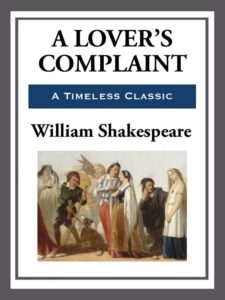
A Lover’s Complaint: “A Lover’s Complaint” is a narrative poem by William Shakespeare that explores the themes of betrayal, heartbreak, and loss. The poem tells the story of a young woman who, having been seduced and betrayed by a man,
is struggling to deal with the aftermath of their relationship. It uses vivid imagery and figurative language to convey the speaker’s deep pain and despair at the betrayal of the man she loved.
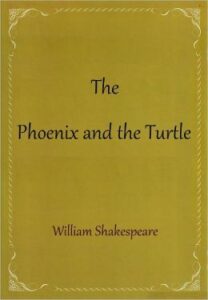
The Phoenix and the Turtle: “The Phoenix and the Turtle” is a poem by William Shakespeare that was first published in 1601 as part of a collection of poems by different authors, including John Marston, George Chapman, and Ben Jonson. The poem is an allegory that describes the funeral of a mythic phoenix and a turtle dove,
which are thought to represent the ideals of constancy and love. The poem depicts the love between the phoenix and the turtle as an ideal pairing. It is an elegy mourning the death of the phoenix and the turtle dove, who die together in a fire.
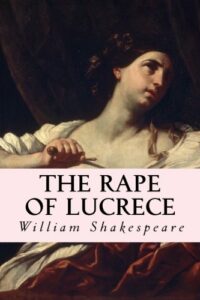
The Rape of Lucrece: “The Rape of Lucrece” is a narrative poem by William Shakespeare that tells the story of a Roman matron named Lucrece, who Tarquin, the king’s son, rapes. The poem explores themes of sexual violence, honor, and revenge.
Lucrece’s suicide after the rape leads to her husband and father vowing revenge on Tarquin. The poem is written in rhyme royal, a seven-line stanza form that uses iambic pentameter and follows an ABABBCC rhyme scheme.
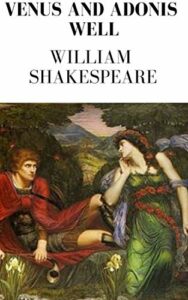
Venus and Adonis: “Venus and Adonis” is a narrative poem by William Shakespeare, first published in 1593. The poem tells the story of Venus, the goddess of love, who falls in love with Adonis, a handsome mortal hunter. Despite Venus’s attempts to seduce him,
Adonis remains focused on his passion for hunting and rejects her advances. The poem explores themes of love, lust, and the conflict between the two. It is also notable for its use of vivid imagery and rich figurative language.
William Shakespeare’s famous poems
William Shakespeare is widely known for his plays, but he was also a prolific poet. He wrote 154 sonnets, two long-form narrative poems, and several shorter poems. Among his most renowned works are his poems:
- Sonnet 18: This poem is often called “Shall I compare thee to a summer’s day?” and is one of the most well-known sonnets in English literature. It is a love poem that compares the beauty of the speaker’s beloved to the beauty of nature.
- Sonnet 29: This sonnet is about the speaker’s inadequacy and despair. It begins with the line “When, in disgrace with fortune and men’s eyes,” and describes the speaker’s envy of others who are more successful.
- Sonnet 73: This poem is a meditation on aging and death. It begins with the line “That time of year thou mayst in me behold” and describes the speaker’s physical decline.
- Venus and Adonis: This long-form narrative poem tells the story of Venus, the goddess of love, who falls in love with Adonis, a mortal man. The poem explores themes of desire, temptation, and mortality.
- The Rape of Lucrece: This long-form narrative poem tells the story of Lucrece, a Roman noblewoman who Tarquin, the son of the king, rapes. The poem explores themes of power, violence, and shame.
- A Lover’s Complaint: This short narrative poem tells the story of a young woman abandoned by her lover. It explores themes of heartbreak, betrayal, and loss.
What Was Shakespeare’s First Play
Shakespeare wrote his first play, a history play titled Henry VI Part II. It was first performed in 1590-1591. However, it is impossible to be sure of the exact order of the plays because no definitive record was made in Shakespeare’s time.
Shakespeare arrived in London probably sometime in the late 1580s, and it is not known how he got started in the theatre or for what acting companies he wrote; it is not easy to determine the dates of his early plays.
He is thought to have written about 38 plays, some of which were collaborations with other writers. To help you better understand, here is a list of Shakespeare’s plays arranged in chronological order by decade:
- The play “The Taming of the Shrew” was written between 1580 and 1590.
- 1590 – 1600 Henry VI Part II, Henry VI Part III, The Two Gentlemen of Verona, Titus Andronicus, Henry VI Part I, Richard III, The Comedy of Errors
- 1600 – 1610 Love’s Labour’s Lost, A Midsummer Night’s Dream, Romeo and Juliet, Richard II, King John, The Merchant of Venice, Henry IV Part I, Henry IV Part II, Much Ado About
Best Shakespeare Sonnets
Shakespeare wrote 154 sonnets, which are some of the most famous poems in the English language. Here are ten of his most celebrated sonnets:
- Sonnet 18: “Shall I compare thee to a summer’s day?”
- Sonnet 29: “When, in disgrace with fortune and men’s eyes.”
- Sonnet 73: “That time of year thou mayst in me behold.”
- Sonnet 116: “Let me not to the marriage of true minds.”
- Sonnet 129: “Th’ expense of spirit in a waste of shame.”
- Sonnet 130: “My mistress’ eyes are nothing like the sun.”
- Sonnet 138: “When my love swears that she is made of truth”
- Sonnet 144: “Two loves I have, of comfort and despair.”
- Sonnet 146: “Poor soul, the center of my sinful earth.”
- Sonnet 147: “My love is as a fever, longing still.”
These sonnets cover love, beauty, mortality, infidelity, and jealousy. Shakespeare’s sonnets are known for their fluid and structured writing style, with word choices that often have multiple meanings. They have influenced writers in every language who take direction from his pioneering style.

William Shakespeare Quotes
Here are some of the most famous quotes from Shakespeare’s works:
- The play As You Like It by William Shakespeare includes the famous quote “All the world’s a stage, and all the men and women merely players.” It is spoken by the character Jaques in Act II, Scene VII of the play. The monologue is known as “The Seven Ages of Man” and describes the seven stages of life.
- The famous quote “To be or not to be, that is the question” is from Hamlet, written by William Shakespeare. It is spoken by the character Hamlet in Act III, Scene I of the play. The monologue is one of the most famous passages in English literature and is often interpreted as a meditation on life and death.
- The famous quote, “What’s in a name? That which we call a rose by any other name would smell as sweet,” is from Romeo and Juliet by William Shakespeare. It is spoken by the character Juliet in Act II, Scene II of the play. Juliet is saying that the name of something does not affect what it is and that even if a rose had a different name, it would still have its wonderful scent.
- The quote “The course of true love never did run smooth” is from William Shakespeare’s play A Midsummer Night’s Dream. It is spoken by the character Lysander in Act I, Scene I of the play. The quote is often taken to mean that love is never easy and always has obstacles to overcome.
- The quote “We know what we are, but know not what we may be” is from William Shakespeare’s play Hamlet. It is spoken by the character Ophelia in Act IV, Scene 5 of the play. The quote is about uncertainty and unpredictability and has a sense of mystery and surprise.
- The quote “Love all, trust a few, do wrong to none” is from William Shakespeare’s play “All’s Well That Ends Well.” It is spoken by the character Countess in Act I, Scene I of the play. The quote is about being kind and loving to everyone and being cautious and selective about whom we trust.
The text emphasizes the significance of refraining from causing harm or doing wrong to others while stressing the importance of ethical behavior toward everyone.
- The quote “There is nothing either good or bad, but thinking makes it so” is from William Shakespeare’s play Hamlet. Hamlet speaks these words in Act II, Scene 2 of the play. The quote expresses Hamlet’s view that one’s perception and attitude shape reality. Some interpretations suggest that the quote implies that evil is good in disguise or that nothing matters to Hamlet.
- The quote “All that glitters is not gold” is a proverb that means something or someone may not be as good or as valuable as they first appear. It warns people not to be deceived by the surface appearance of things or people. The original form of this phrase was “all that glitters is not gold,” and William Shakespeare coined it in his play The Merchant of Venice.
- The quote “The lady doth protest too much, methinks” is a line from Shakespeare’s play Hamlet. It is spoken by the character Queen Gertrude in Act III, Scene II of the play. The line is in response to the insincere overacting of a character in the play created by Prince Hamlet to prove his uncle’s guilt in the murder of his father, the King of Denmark.
The phrase is commonly used to express skepticism about someone’s honesty, especially when vehemently denying something.
- William Shakespeare’s play Hamlet contains a famous quote, “To thine own self be true.” It is spoken by the character Polonius in Act I, Scene III of the play. Polonius is advising his son Laertes before he departs for France. The quote means one should be true to oneself and act according to one’s values and beliefs.
These quotes cover love, life, death, identity, and more. Shakespeare’s works have been translated into every language and have influenced writers in every language who take direction from his pioneering style.
The Importance Of Shakespeare Literature In English Language
Shakespeare literature in English language has a Shakespeare is widely regarded as one of the most influential writers in the history of the English language. His works have shaped the development of English literature, linguistics, and theatre for centuries. Here are some of the reasons why Shakespeare’s literature is important for the English language:
Shakespeare contributed to the standardization of the English language in the 17th and 18th centuries. As his work gained importance, correctly spelling words became more common. He created compound words, adverbs, and adjectives from verbs. Shakespeare added suffixes and prefixes to many words.
Shakespeare introduced 1,700 original words into the language, many of which we still use (despite significant changes to the language since Shakespeare’s time). Some of these words are assassination, addiction, generous, lonely, majestic, and countless2. He also coined many phrases that have become idioms in everyday speech, such as “break the ice,” “the green-eyed monster,” “a foregone conclusion,” and “a sorry sight.”
Shakespeare explored many universal themes in his plays and poems, such as love, death, betrayal, revenge, ambition, power, and justice. These themes are still relevant and relatable to modern audiences, reflecting human nature and experience. Shakespeare also created complex and realistic characters that express various emotions and motivations.
Shakespeare had a profound impact on the theatre industry, both in his own time and in later periods. He wrote in various genres, such as tragedy, comedy, history, and romance. He experimented with different forms of drama, such as blank verse, soliloquy, and dramatic irony. He influenced many playwrights and actors who followed him, such as Ben Jonson, John Dryden, Samuel Johnson, David Garrick, and Laurence Olivier.
Shakespeare’s literature is a treasure trove of linguistic and literary innovation. His works have enriched the English language with new words, expressions, and styles. His works have also inspired countless adaptations and interpretations in various media and cultures. Shakespeare’s literature is not only crucial for the English language but also the world culture.
How Did William Shakespeare Die
The cause of William Shakespeare’s death is unknown, but some possible factors are:
- He died on April 23, 1616, the traditional date of his birthday, which may have been a coincidence or a result of a legend.
- He had been sick for more than a month before he died and signed his will with a shaky signature on March 25, 1616.
- He contracted a fever after a night of heavy drinking with two other writers, Ben Jonson, and Michael Drayton, according to a later account by a local vicar.
Shakespeare’s death remains mysterious, with many theories about what caused it. However, the most widely accepted theory is that he died of an illness.

